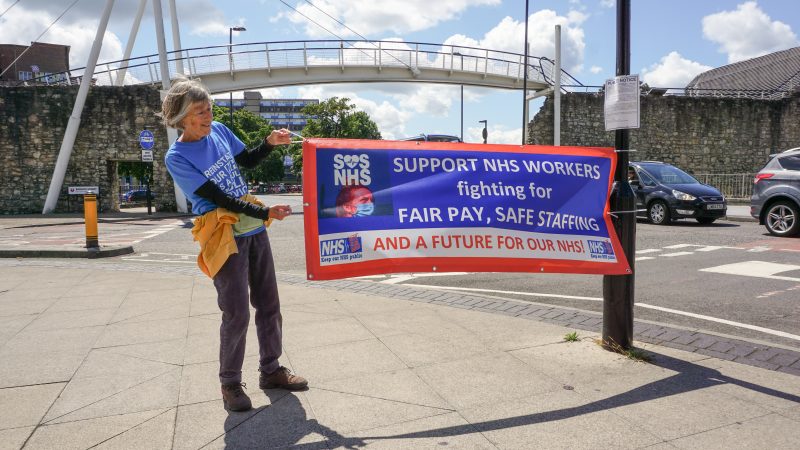 © Twitter/@Keir_Starmer
© Twitter/@Keir_StarmerA ban on “exploitative” zero hour contracts, bolstered day-one rights and strengthened statutory sick pay are among the measures set to feature in Labour’s flagship employment rights bill, due to be brought before parliament today.
This legislative first step of Labour’s New Deal for Working People, which was promised within 100 days of Labour entering office in its election programme, is set to introduce 28 individual employment reforms.
The details of this legislation have been closely awaited by unions and businesses alike, with it likely to go down as one of the most significant reforms put forward by the Labour government to date.
Deputy Prime Minister Angela Rayner said: “This Labour government’s plan to make work pay is central to achieving our growth mission, boosting productivity. After years of stagnation under the Tories, we’re replacing a race to the bottom with a race to the top, so employers compete on innovation and quality.”
The details of this legislation have been closely awaited by unions and businesses alike, with it likely to go down as one of the most significant reforms put forward by the Labour government to date.
Workers will have protection against unfair dismissal from day one rather than having to wait two years, though this and some other measures may not come into effect until 2026, despite union calls for immediate delivery of the government’s package.
The government has also notably promised to consult on a new statutory probation period that Labour says will enable firms to still “take chances on hires with a lighter touch process”.
The government is reportedly considering probation periods of up to nine months, longer than wanted by unions.
The legislation also does not include the right to switch off, which is reportedly set to be enacted as a code of conduct instead, and government and Labour press releases do not mention collective bargaining plans in social care. More documents will be published later on Thursday, however.
Reforms to zero-hours, fire and rehire, workplace flexibility and statutory sick pay
Reforms proposed under the bill include an overhaul to zero hour contracts, with plans to introduce a right to a guaranteed hours – unless the employee chooses to remain on their existing zero-hours contract, in a revision of past party plans to ban them altogether.
The government also intends to close loopholes that allow “fire and rehire” practices to continue – something that has long been pushed for by campaigners.
Meanwhile improving workplace flexibility and supporting working families are two key themes the legislation aims to focus on, with plans to make flexible working the default unless an employer can show it is not viable, and a new right to bereavement leave.
The new bill also aims to bring 30,000 fathers or partners into scope for paternity leave and introduce unpaid parental leave as a day one right – a move the government claims would give extra flexibility to 1.5 million parents.
Statutory sick pay rights will receive a boost too, with the lower earnings limit for all workers to be removed and the wait period abolished.
READ MORE: Labour’s first Budget 2024: What policies could Rachel Reeves announce?
Business Secretary Jonathan Reynolds said: “It is our mission to get the economy moving and create the long term, sustainable growth that people and businesses across the country need. Our plan will give the world of work a much-needed upgrade, boosting pay and productivity.
“The best employers know that employees are more productive when they are happy at work. That is why it’s vital to give employers the flexibility they need to grow whilst ending unscrupulous and unfair practices.
“This upgrade to our laws will ensure they are fit for modern life, raise living standards and provide opportunity and security for businesses, workers and communities across the country.”
The government is also set to consult on a new statutory probation period to allow for “proportionate” assessment by employers of a new hire’s abilities while still granting better day one rights.
Further measures expected include the creation of a Fair Work Agency to enforce certain workers’ rights and the removal of age bands from the minimum wage – which will also see cost-of-living taken into account when it is set.
Unions welcome reforms
Reacting to the reforms, TUC General Secretary Paul Nowak said: “The government’s plan to Make Work Pay – delivered in full – would improve incomes and the quality of work across Britain.
GMB General Secretary Gary Smith echoed Nowak’s sentiments, describing the Employment Rights Bill as a “groundbreaking first step” towards better employment rights.
However, he added: “The government won a huge mandate for the New Deal, now they must make sure unions and workers are front and centre of the detailed discussions needed to deliver it.
“The legislation must be watertight and without loopholes that could be used by those wanting to delay the rights workers so desperately need.”
Fire Brigades Union General Secretary Matt Wrack called the programme a “very significant extension of workers’ rights” and a “huge victory for the FBU and other unions”. But he warned “there must be no delay in the full implementation”.
But Unite general secretary Sharon Graham said: “This Bill is without doubt a significant step forward for workers but stops short of making work pay.”
Meanwhile Tina McKenzie, policy chair at the Federation of Small Businesses, claimed: “This legislation is rushed job, clumsy, chaotic and poorly planned – dropping 28 new measures onto small business employers all at once leaves them scrambling to make sense of it all.
“Beyond warm words, it lacks any real pro-growth element and will increase economic inactivity, seriously jeopardising the Government’s own 80 per cent employment target.”
But Reynolds told the BBC: “I would reject that very strongly. First of all, there’s no surprises here. Everything in this package was in the manifesto.
“Second of all, there is a very strong business rationale for these measures in terms of getting more people into work, in terms of making sure there’s a link between job satisfaction and productivity.”
Nicola Ranger: ‘The New Deal must enshrine care workers’ pay rights in law – so they’re not ignored or repealed’

Last week, a would-be Tory leader insulted care workers with a comment about wiping bottoms. This week, a Labour government has a chance to get on the front foot again with transformative plans for the sector’s workers. The employment rights bill, expected tomorrow, could be one of the most important changes in the law since the Equality Act.
“I’m on an insecure contract and dread being sick. It is so stressful for me and my kids always being skint.” I cannot stress how often I hear words like this.
Nine in 10 of my members are women and a large and growing number are international recruits – the very migrant care workers that Kemi Badenoch appeared to be taking aim at.
In the Royal College of Nursing, we represent registered nurses, carers and support workers in social care just as much as the NHS. But their employment terms and conditions could not be more different.
Negotiating a good deal
In the UK, there are over 30,000 organisations providing social care to adults, children and young people. They are a crucial part of the health and care system. Some are genuinely good employers who value and reward their staff but the reality is that too many force workers to live with low pay, insecure employment and few rights.
Without sick pay provision, nursing staff choose between their own health and their much-needed income. And protections around workplace harassment, women’s health and flexible working could not be needed more. Advancing women’s rights in the workplace must be central to the government’s bill on Thursday.
Care workers, the vast majority of whom are female, are at the intersection of an undervalued profession considered ‘women’s work’ and a sector so vast and atomised it resembles a ‘Wild West’ of employment standards – employed by their local authority, a private care firm, or even a hedge fund.
There is no opportunity for staff to negotiate and make their voice heard on a sector-wide level, allowing a race to the bottom on pay and rights. And at worst – as we were part of exposing this summer – flagrant, unchecked exploitation of migrant workers.
The government’s proposals must mark the beginning of the end for this disgrace. We expect proper sectoral bargaining finally introduced first for adult social care. This should allow consistent pay, terms and conditions to be set across the sector, providing better job security and, crucially, raising employment standards for everyone working in the sector. Along with all unions, we have called for this for many years.
Protecting our workers’ rights
In the consultations and debates around the new Bill, we will push the government to properly enshrine sectoral bargaining in law. The absence of that could simply allow rogue employers to find loopholes and pave the way for a future government to easily rip up or quietly abandon the measures entirely.
The government’s plan to introduce statutory sick pay from day one is a crucial first step. Next, we need commitments to enhance the level of sick pay itself – and make that a right from the very start of employment too. Like so much in society, changes during the pandemic saw sick pay paid from day one only for the progress to be lost in the years after.
Tomorrow’s Bill is expected to transform the work of unions as well as the working lives of their members. The promised repeal of anti-union laws – reaffirmed in a letter I received last week from Jonathan Reynolds – along with the introduction of e-balloting, could pave the way for a new era in the business of industrial relations and trade unionism.
These changes will give nursing staff greater power to organise, demand fair pay and improve working conditions in a profession historically characterised as a vocation. Female-dominated professions remain some of the worst paid, with inferior terms and conditions. The last government learned the hard way that ignoring nursing staff and stripping away their rights will not be tolerated.
These vital discussions on health and safety at work or strengthening protections for women – and all workers – would be enriched by reaching out to our nursing staff and working with one of the country’s biggest professional bodies and unions.
Sectoral bargaining in social care, advancing women’s workplace rights, and bringing down the curtain on some of Europe’s most restrictive trade union laws is the strong starting point our profession is already expecting of this government on Thursday.
Let’s collaborate further so that the bold and new approach truly delivers for working people.
















